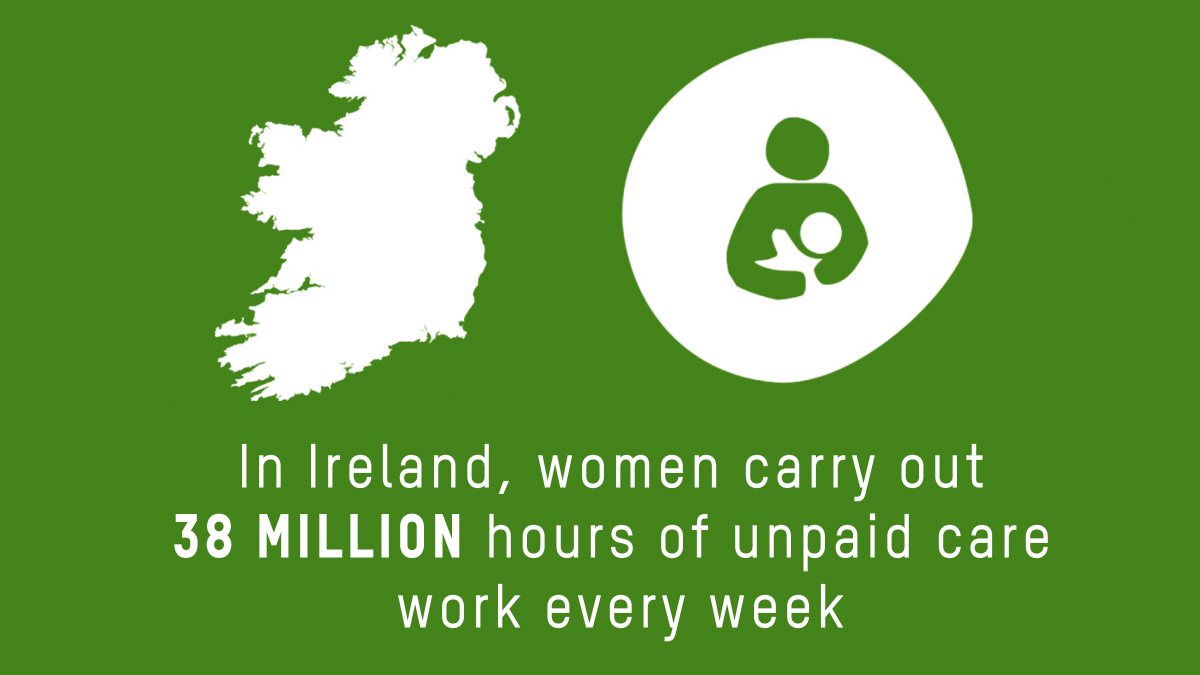- 3 min read
- Published: 29th August 2022
Budget 2023 can advance gender justice through supporting care work

The COVID-19 crisis has shown that care work, often unpaid, is the “hidden engine” that keeps the wheels of our economies, businesses and societies turning. It is driven primarily by women and girls who often have little or no time to earn a decent living, to get involved in their communities or have a say in how their societies are run- Eurostat data shows that the share of women in Ireland outside the labour market due to caring responsibilities remains almost double the EU average.
Care work continues to provide a foundation for our society and economy as we manage the aftermath of the pandemic, the economic and social consequences of the invasion of Ukraine and the impact of spiralling inflation. Care work (paid and unpaid) in Ireland and around the world is highly gendered and undervalued in terms of pay and recognition. Many workers in the care sector are still paid poverty wages. Irish women spend 38 million hours a week on unpaid care work, contributing at least €24 billion to the economy every year – the equivalent of 12.3 percent of the entire annual Irish economy. Globally, women do more than three-quarters of all unpaid care work. Women and girls are putting in 12.5 billion hours of unpaid care work every day, which amounts to a contribution to the global economy of at least $10.8 trillion a year – more than three times the size of the global tech industry.
Care work highlights the important role of low-wage workers in terms of the provision of essential goods and services. Most importantly, the COVID 19 pandemic has emphasised the hugely important role women play in our economy, despite the unequal rewards and recognition they receive. A study of essential workers by the ERSI has found that the majority (almost 70 percent) of essential employees in Ireland are female. This trend is replicated worldwide, with more than 70 percent of healthcare workers worldwide being female.
Provision of care services (e.g. childcare, or care for the elderly or people with special needs) by the Irish State is relatively low, forcing households to provide these services themselves, or pay for them – if they can afford it. Oxfam Ireland supports the National Women’s Council’s proposal in their pre-budget submission that:
“The most effective and efficient way to tackle persistent gender inequalities in care is sustained investment in public services and social infrastructure, including a public early years and school age childcare system and universal adult social care. Investment in care has been shown to act as a better post-pandemic economic stimulus than investment in traditional economic recovery approaches, such as construction. Producing significantly less emissions than construction, care jobs are also green jobs so investment in care also helps us meet our climate goals.”
Using the report of the Citizens’ Assembly on Gender Equality, with its strong emphasis on care, as a framework to guide Budget 2023 investment, the Irish Government should:
- Ensure significant extra investments in public services and social infrastructure to enhance care services and resource a ‘Commission on Care’ as outlined in the Programme for Government. For example, investment must be increased in early years education to bring overall expenditure in line with the UNICEF recommendation of one percent of GDP.
- Ensure care workers employed or funded by State programmes are properly compensated to at least a living-wage level.
- Hold a referendum on Art. 41.2 of the Constitution on the role of women in the home, as recommended by Citizens’ Assembly on Gender Equality. New language in the constitution should refer explicitly to gender equality and non-discrimination and recognise the value of care work in Irish society.
- Deliver integrated changes in social and employment policies that support carers, facilitate the combination of care and employment, while at the same time encourage and support greater male participation in care.
- Prioritise gender budgeting: Gender budgeting must be prioritised by the Government to assess the possible impact of fiscal and spending decisions on women and girls and enable the collection and allocation of national and international funds in ways that promote gender equality.
- Develop and properly resource the Equality Budgeting process beyond the current pilot stage to include all dimensions of inequality, including poverty, socioeconomic inequality and disability.
For more details of how Budget 2023 can contribute to addressing inequality, ending poverty and creating a more sustainable world please see our pre-budget submission HERE
